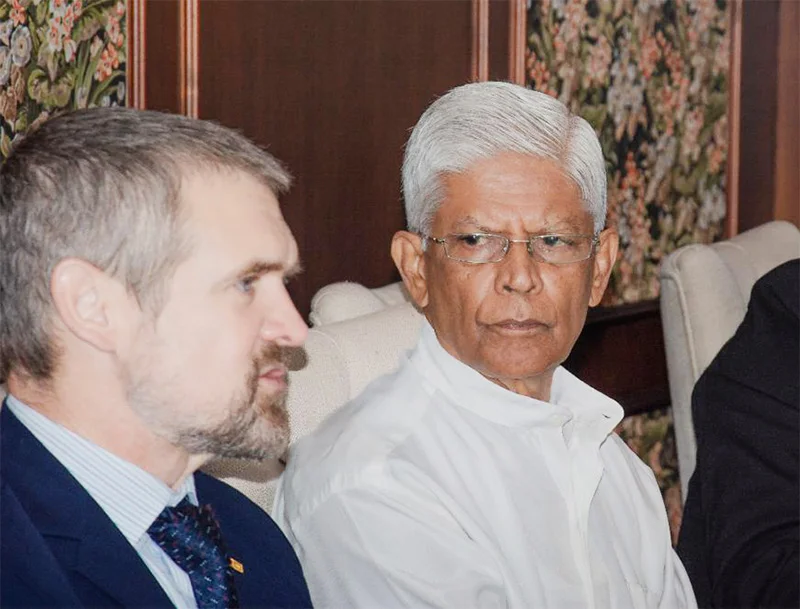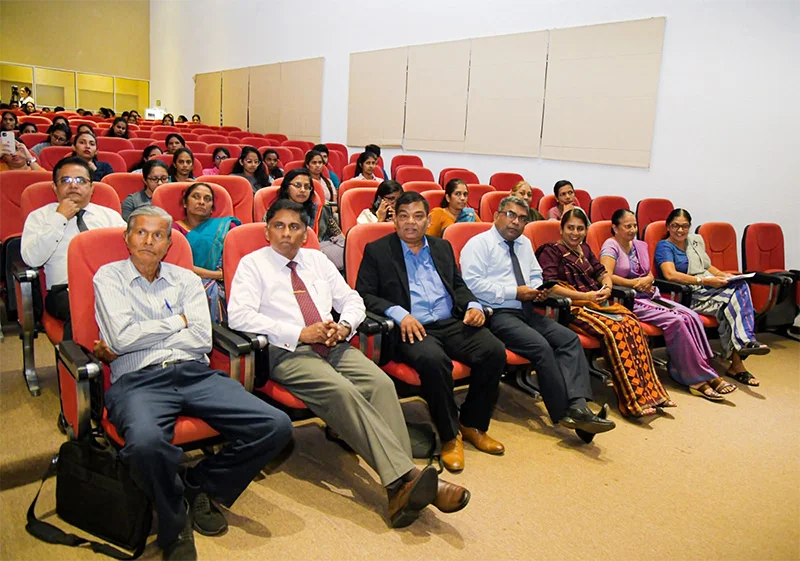Business
Ensuring sustainability in the pharma industry: key focus for 2021 says slcpi

The Sri Lanka Chamber of the Pharmaceutical Industry (SLCPI) reiterated their commitment towards ensuring the availability of efficacious, safe and good quality medicines to the general public, in the incoming year. When the COVID-19 pandemic forced the country into lockdown earlier this year, many industries, including pharmaceuticals, found themselves facing multiple challenges, which inevitably turned into valuable lessons for the year ahead.
Member companies of SLCPI were forced to act quickly to ensure the uninterrupted supply of medicine. They witnessed their business models change in real-time and at an unprecedented pace, which prompted the collaboration of various stakeholders to ensure that patients were always given priority.
From supply chain disruptions to the adaptation of new technology, SLCPI as an organisation is fully geared to face the year ahead and has identified several key areas that are seen as essential if the industry remains sustainable in the long run.
Creating a resilient supply chain
Locally and globally, one of the biggest lessons learnt during the pandemic for pharma-companies was managing pharmaceutical supply chain disruptions in response to COVID-19. With sudden changes to air routes and temporary interruptions to sea freight earlier this year, many companies had to formulate contingency plans to ensure an uninterrupted supply of medicine to the market. SLCPI member companies were quick to respond with critical adjustments made to its business processes, which resulted in a more agile and patient-centric supply chain.
Establishing effective communication across all departments; reaching out to principals from the very start of the lockdown to ensure that there was adequate inventory; and, working closely with government authorities was an essential element in creating a resilient supply chain.
Throughout this process, priority was given to patients’ with NCDs’ and essential medicine. SLCPI is thankful for members who worked tirelessly to ensure that adequate stocks of essential medicines were made available to patients and hospitals.
Towards sustainable pricing
Another top priority for the Chamber in the coming year is the implementation of a fair pricing mechanism, to ensure the availability of efficacious, safe and good quality medicines, medical devices and borderline products to the general public.
At present, the government and regulators depend on ad-hoc price controls on medicine and pharmaceuticals to keep prices in check. This mechanism has proven to be unsustainable in the long run.
Presently, the National Medicine Regulatory Authority of Sri Lanka (NMRA) has imposed a price ceiling on 73 molecules with the intention of making these medicines more affordable and accessible to patients.
The lack of a proper mechanism for the regulation of prices along with high regulatory fees has only negatively impacted the industry, which is already burdened by fragile market conditions owing to COVID-19 and a depreciating rupee, making importing drugs more expensive.
“What we need right now is a rational mechanism that is simple & workable. Pharmaceutical poricing is complex as we are dealing with medicines, patients and the country’s healthcare needs. It is essential to take a collaborative approach between the industry and regulators on the best way forward” stressed SLCPI Vice President Sanjiva Wijesekera.
The World Health Organisation (WHO) states that strong pharmaceutical pricing policies in countries can improve pharmaceutical products’ affordability when carefully planned, carried out, and regularly checked and revised according to changing conditions (WHO guideline on country pharmaceutical pricing policies, 2020).
Essential to the Pharma Industry’s sustainability is the implementation of an ethics framework, to maintain standards and uniformity in the industry. The Chamber recognises the need for self-regulation, which is pivotal to address non-ethical practices in the healthcare industry. SLCPI is committed to working with stakeholders within the medical fraternity to promote ethical marketing, prescribing medicines, and creating awareness on a subject that impacts the image of the healthcare industry as a whole.
Over the years, SLCPI has hosted workshops and courses to promote ethical pharmaceutical practices among pharmaceutical representatives to ensure they are well trained on the rules, regulations and industry codes. Meanwhile, several SLCPI member companies have gone as far as to provide training to pharmacists on dispensing medicines to customers.
“The focus in the year ahead is to work with doctors and healthcare professionals to standardise the behaviour of medical representatives, minimise complaints received by hospitals and collaborate with governmental partners to implement and action, an ethics framework,” said SLCPI Vice President Sanjiva Wijesekera.
COVID – 19 has been a defining year for the industry, forcing companies in all sectors to accelerate the digitisation of their customer and supply-chain interaction and their internal operations by three to four years (Mckinsey, 2020).
What does the future hold?
Vice President of SLCPI Sanjiva Wijesekera says that emerging technologies are transforming the pharmaceutical sector, and members are integrating new technology in their day to day operations.
“The pharma industry is striving to maintain a balance between the need for novel medicinal drugs, improved operational efficiencies, and innovation in areas such as precision medicine, wearables, and digital therapeutics—all of which can directly impact the pharma value chain,” said SLCPI Vice President Sanjiva Wijesekera.
With a rapidly ageing population and rise in non-communicable diseases (NCD) in Sri Lanka, the demand for pharmaceuticals and medical care too is increasing.
“SLCPI is committed to its vision of making available quality medicines for all Sri Lankans, and we need to enhance our systems to ensure that we make this possible. At a consumer level, there is also more that can be done to educate the public about the impact that their lifestyle choices can have on the quality of life. By adopting a holistic strategy that addresses all stakeholders, I believe that we can arrive at a truly progressive outcome for all,” Wijesekera added.
Business
How middle powers cooperate to achieve shared goals

‘Australia’s engagement with institutions, such as the Indian Ocean Rim Association (IORA) and “minilateral” platforms, including the Quad and the Combined Maritime Force, are practical examples of middle powers working together to address shared challenges ranging from ocean piracy to humanitarian assistance, Australia High Commissioner to Sri Lanka Matthew Duckworth said at a recent round table forum featuring the media and other important sections, held at the Colombo Club of the Taj Samudra Hotel on the topic ‘Middle Power Diplomacy.’
The forum was organized and conducted by the Pathfinder Foundation of Sri Lanka under the moderation of the latter’s Chairman, Ambassador (Rtd.) Dr. Bernard Goonathilake.
High Commissioner Duckworth underscored that such cooperation is not directed against any particular country but aims to preserve an open, inclusive, and rules-based regional order.
H.C. Duckworth acknowledged the reality of major power competition while stressing that Australia seeks stable and respectful relations with all countries, including Sri Lanka, cooperating where possible and disagreeing where necessary, without compromising core national interests.
Further, the H.C. focused on India’s evolving role in the Indian Ocean, the trajectory of China’s rise, the durability of the current global order, alliance dynamics, and Sri Lanka’s positioning in the Indian Ocean.
Responding to a question about India, the High Commissioner affirmed that Australia expects all major powers—India, China, and the United States—to act transparently and to respect the sovereignty of smaller states. On whether the current emphasis on middle-power diplomacy is a temporary shift or a long-term trend, the High Commissioner stated that middle powers must now play a more visible and proactive role in sustaining international norms and institutions.
H.C. Duckworth added that Australia invests in Sri Lanka in sectors, such as, minerals, renewable energy, textiles and education services. The High Commissioner reiterated Australia’s support for open trade and deeper regional economic integration, emphasizing the importance of economic resilience in a contested global environment.
The Pathfinder Foundation is a Colombo-based think tank dedicated to fostering informed dialogue on foreign policy, economic development and strategic affairs.
By Hiran H Senewiratne
Business
Green Minds: A new platform to rethink environmental governance in Sri Lanka

The Ministry of Environment yesterday launched a new knowledge-sharing platform titled Green Minds, aimed at strengthening environmental thinking and institutional capacity among public sector officials, at a time when Sri Lanka is facing mounting ecological stress and climate-related challenges.
The inaugural session of the monthly programme was held on February 12, 2026, at the Ministry auditorium under the patronage of Secretary to the Ministry of Environment, K. R. Uduwawala, with the participation of senior officials from the Ministry and its affiliated institutions.
Addressing the gathering, Secretary Uduwawala said that Green Minds was designed not merely as another training initiative, but as a thinking space for public officials to critically engage with emerging environmental concepts and global best practices.
“Environmental governance today is no longer limited to regulations and enforcement. It requires new ways of thinking, interdisciplinary approaches and continuous learning. Green Minds is intended to become a platform where officials can reflect, debate and update themselves on these evolving realities,” Uduwawala said.
He stressed that Sri Lanka’s environmental institutions must move beyond routine administrative practices and embrace knowledge-driven policy making, particularly in areas such as climate adaptation, biodiversity conservation, sustainable resource management and environmental justice.
The keynote lecture at the inaugural session was delivered by Senior Professor Siri Hettige, who spoke on the role of social sciences in achieving sustainable development in Sri Lanka. He highlighted the often overlooked social dimensions of environmental problems.
“Environmental issues are not purely scientific or technical. They are deeply social. Human behaviour, consumption patterns, inequality and governance structures all shape environmental outcomes,” Prof. Hettige said.
“If we want sustainability, we must understand society as much as we understand nature.”
He pointed out that many environmental policies fail because they do not adequately consider community realities, livelihoods and social power relations.
“You cannot conserve forests without understanding people. You cannot manage waste without understanding urban lifestyles. Sustainability is fundamentally a social project,” he added.
Following the keynote, a high-level panel discussion on strengthening environmental awareness brought together Prof. Hettige, Dr. Herath Vidyaratne, environmental policy analyst, Ravindra Kariyawasam, Adviser to the Minister of Environment, and S. C. Palamakumbura, Conservator General of Forests.
Kariyawasam said Sri Lanka was at a critical juncture where environmental decision making must be aligned with national development priorities.
“We can no longer treat the environment as a separate sector. It has to be integrated into economic planning, infrastructure development and social policy. Green Minds offers a space for officials to think beyond institutional silos,” he said.
Dr. Vidyaratne stressed that environmental literacy among state officials was essential in responding to complex challenges such as climate change, water scarcity and ecosystem degradation.
“The problems we face today are interconnected. Climate change is linked to food security, public health and migration. Officers need systems thinking, not just subject knowledge,” he said.
Meanwhile, Palamakumbura highlighted the importance of translating environmental awareness into institutional action.
“We have knowledge, laws and policies. What we need is consistent implementation and a shared environmental ethic across all institutions. Platforms like Green Minds can help build that collective responsibility,” he said.
He noted that forest conservation, wildlife protection and ecosystem restoration could not succeed without inter-agency cooperation and informed decision makers.
By Ifham Nizam
Business
Third quarter financials highlight 30% PBT growth for Aitken Spence in FY 2025/26

Spanning tourism, maritime and freight logistics, strategic investments and services, with operations across the region, Aitken Spence PLC, with a legacy of over 157 years, continues to pursue excellence. The Group recorded revenue of Rs. 67 billion for the nine months ending 31st December 2025, underscoring a robust performance across its portfolio of industries. The Tourism sector accounted for 68% of Group revenue, while the Maritime & Freight Logistics sector and Strategic Investments sector contributed 18% and 12% respectively. Furthermore, the Group’s revenue for the third quarter improved by 3.8%, reflecting steady performance across key sectors.
The Group’s total Profit Before Tax (PBT) stood at Rs. 5.6 billion for the nine months ending 31st December 2025, compared to Rs. 4.3 billion in the corresponding period of the previous year, reflecting a growth of 30%. Correspondingly, the Group’s Profit After Tax improved by 42% to reach Rs. 3.4 billion.
Sectoral Performance
The Tourism sector recorded the most notable improvement during the period under review, reporting a Profit Before Tax (PBT) of Rs. 2.0 billion for the nine months ended December 2025. This performance was primarily attributable to the sustained recovery and growth of the tourism industry in Sri Lanka. In addition, the sector benefited from significant improvements in profitability at the Group’s Maldivian resorts, as well as enhanced operating performance across hotel operations in India and Oman.
The Group’s Maritime & Freight Logistics sector was the largest contributor to Profit Before Tax for the period under review, reporting a Profit Before Tax of Rs. 3.3 billion. Sector performance, however, was moderated by lower volumes and margin pressures, particularly impacting overseas freight and airline operations. This was reflected in the reduced contribution from the sector’s equity-accounted investee for the period.
In the Strategic Investments sector, the key contributing segments of printing and plantations both recorded stellar performance for the period under review despite the challenging market conditions of these industries, while the power generation segment witnessed a steady performance with notable contributions from the Waste-to-Energy and renewable power generation operations. However, the significant losses incurred in the apparel manufacturing segment impacted the overall performance of the sector, resulting in a loss of Rs. 652 million at PBT level.
The Services sector recorded strong growth during the period under review, driven primarily by the expansion of operations at Port City BPO, the Group’s most recent investment. This performance was further supported by improvements in performance by the Group’s elevators segment. As a result, the Services sector reported a Profit Before Tax of Rs. 843 million, compared to Rs. 114 million in the corresponding period of the previous year.
The period was marked by notable achievements:
Aitken Spence PLC became the first and only diversified holdings company in Sri Lanka to have its climate targets validated by the Science Based Targets Initiative (SBTi).
-

 Life style3 days ago
Life style3 days agoMarriot new GM Suranga
-

 Business2 days ago
Business2 days agoMinistry of Brands to launch Sri Lanka’s first off-price retail destination
-

 Features3 days ago
Features3 days agoMonks’ march, in America and Sri Lanka
-

 Midweek Review7 days ago
Midweek Review7 days agoA question of national pride
-

 Business7 days ago
Business7 days agoAutodoc 360 relocates to reinforce commitment to premium auto care
-

 Opinion6 days ago
Opinion6 days agoWill computers ever be intelligent?
-

 Features3 days ago
Features3 days agoThe Rise of Takaichi
-

 Features3 days ago
Features3 days agoWetlands of Sri Lanka:













